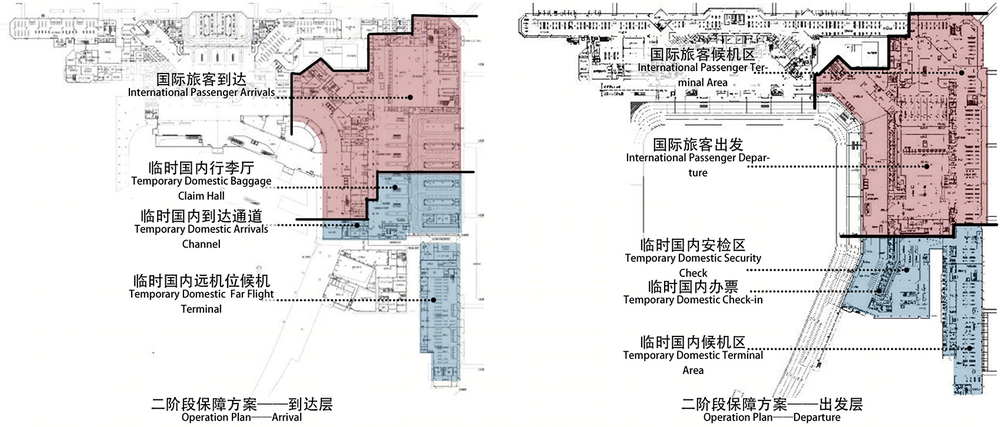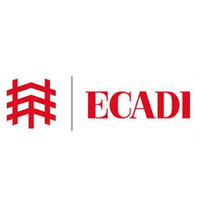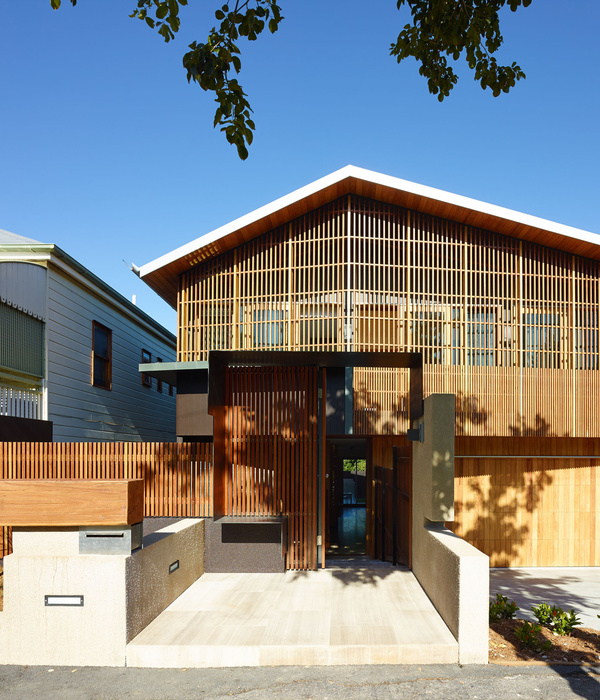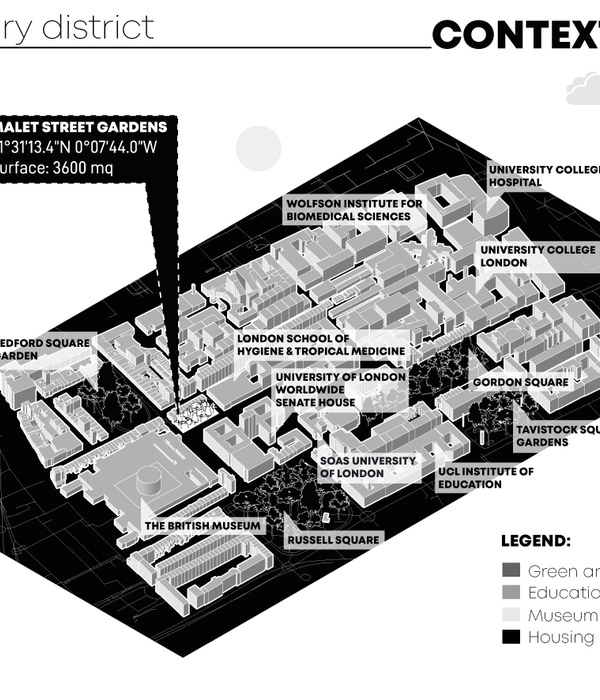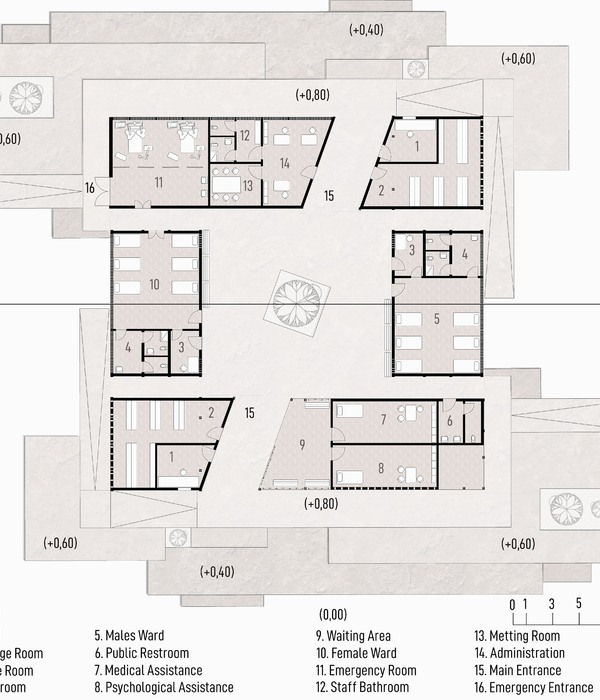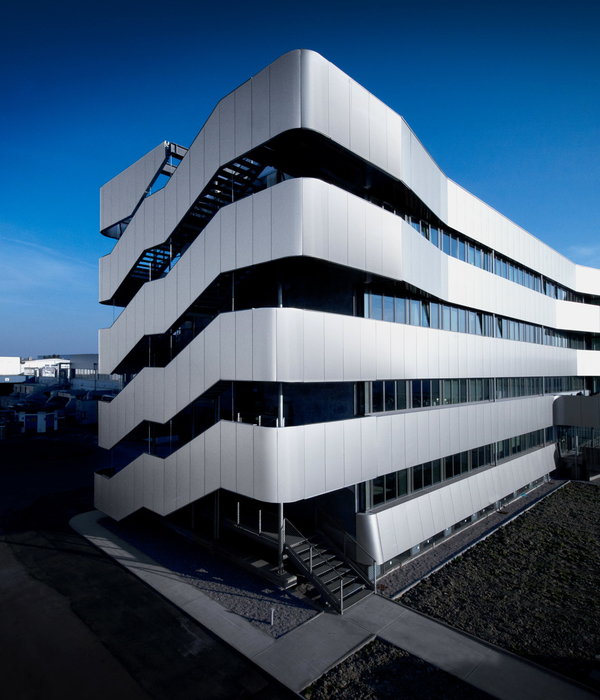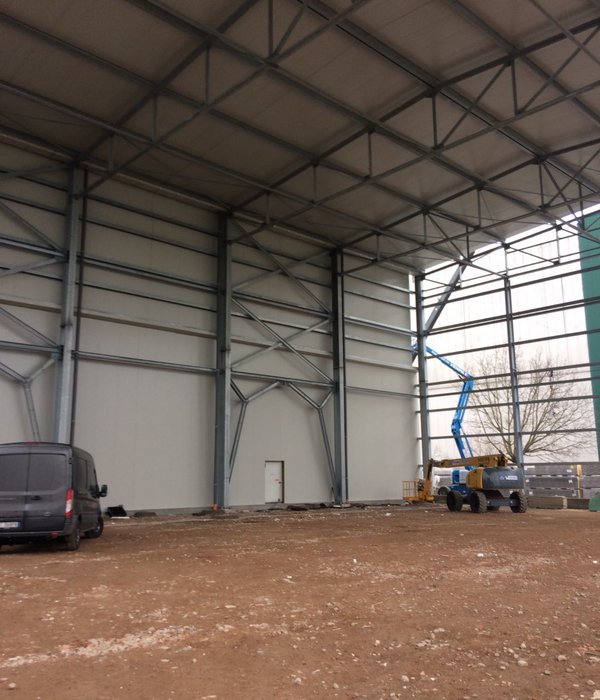上海虹桥国际机场 T1 航站楼改造 | 一站式航空体验的创新设计
虹桥机场的历史可以追溯到上世纪初,东侧的T1 航站区建设年代久远,虽经历过多次改造与扩建,仍然面临着设施陈旧、规划建设标准低的问题。此次T1 航站楼的系统升级改造,对完善虹桥商务区服务功能、带动虹桥商务区东片区综合改造进而实现“脱胎换骨”的转变具有重要意义。
SHA Terminal 1 was built in the beginning of the last century. Due to the disordering construction and outdated facilities in past time, the current urban environment & traffic are messy and supporting facilities are insufficient, which fail to meet the requirements of developing modern aviation business districts. The upgrade reconstruction of Terminal 1 serves as a leading project to improve the service of Hongqiao Business District which has brought great significance to the comprehensive regeneration of the east area of Hongqiao Business District. This project takes improving the quality of airport service and transforming the 100-year-old Terminal into a “Boutique Terminal” as the goal.
▼T1航站区鸟瞰,SHA Terminal 1 overview

T1航站区经过重新规划,分为航站楼功能区、交通换乘区和南侧、北侧综合开发区四个部分。T1航站楼建成后可承担年旅客吞吐量1000 万人次; 交通中心承担航站区到发旅客的交通换乘功能;南侧、北侧地块的定位是配套综合开发功能;最终形成一体化的航站楼综合体。
SHA Terminal 1 is built into a complex integrating terminal, Ground Transportation Center (GTC), hotel, office, and business function. Nearly 10 million passengers boarding or deplane from terminal 1 per year. The renovation of Terminal 1 is committed to bringing about comprehensive improvement of the surroundings, achieving a leap in traffic quality, upgrading the urban space and creating a high-quality aviation experience for passengers.
▼区域规划,master plan
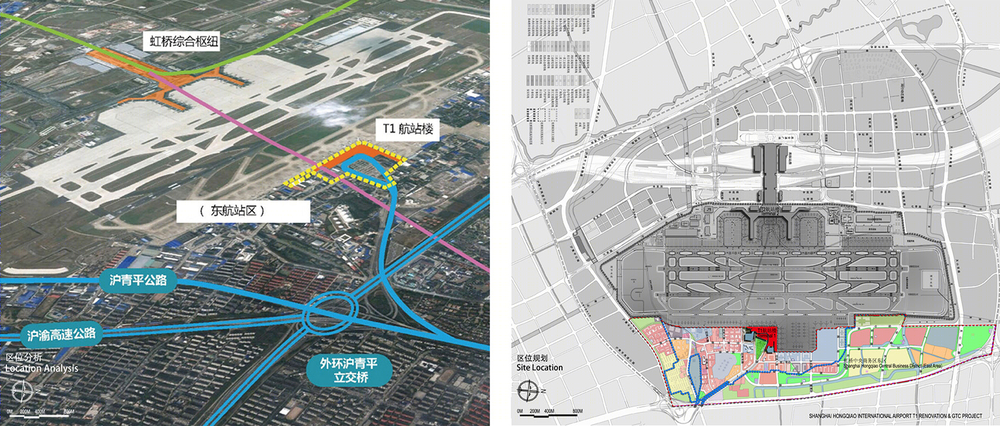
▼建筑改造前后对比,renovation before and after

航站区外部空间环境与建筑形态一体化设计,相互映衬,形成整体过渡的空间序列。交通中心区域的集中绿化提升了航站楼门前整体景观形象。
The design of the architectural form is integrated with the exterior environment. The roof of underground parking garage provides more than 20,000 square meters of greenery landscape which greatly improves the terminal area environment.
▼综合分区,zoning
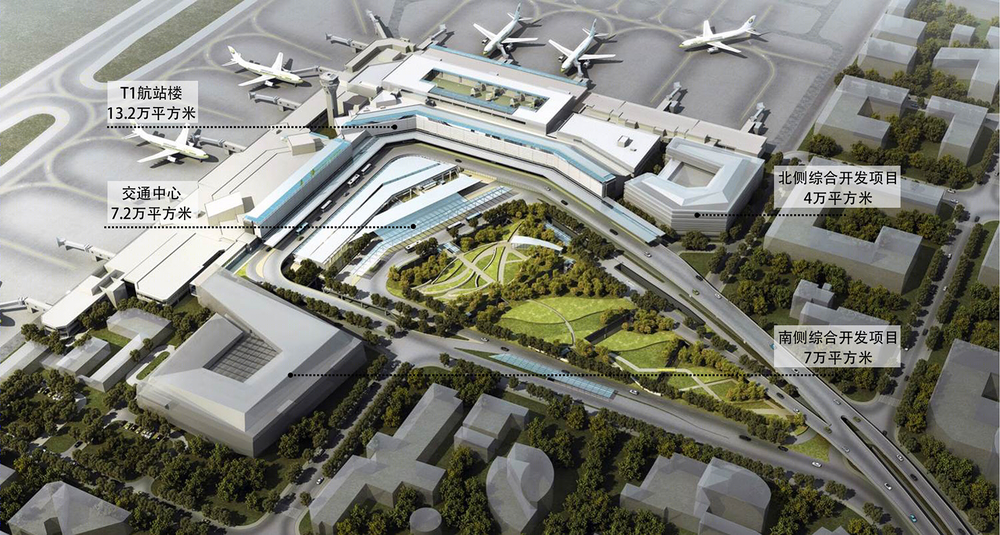
▼综合分区剖面图,sectional perspective
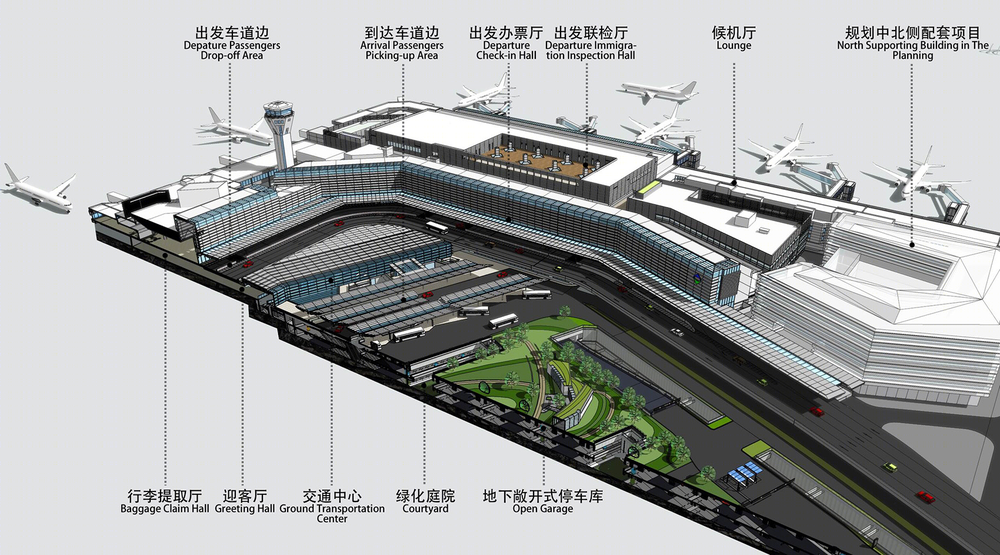
▼既有建筑年份以及改造前后对比,comparison of the existing terminal and the building after renovation

同一屋檐下便利的换乘中心,集合各类陆侧交通换乘模式,换乘便捷,提高公共交通载客比例。多样、高品质的购物环境改善旅客出行体验。新技术、智能化设施的应用提升航站楼服务品质。
▼一体化的空间序列,an integrated space sequence
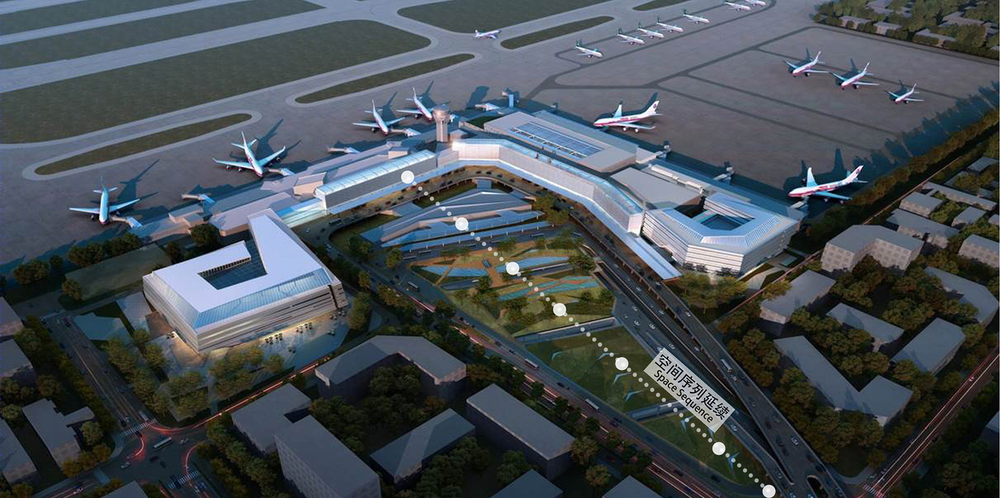
The internal functions of the terminal are re-organized to provide safe, convenient and exquisite services for passengers. Such as the newly-built GTC provides safe and convenient transportation transfer, fully self-service facilities enhance passengers’ travel experience, which also allows Terminal 1 to become one of the first Golden Airports in China. The recreation of commercial space and business environment create a sophisticated service to meet with the comprehensive needs from passengers. The application of new technologies and intelligent facilities elevates the terminal service quality.
▼交通换乘厅共享空间,transportation transfer hall

▼交通换乘厅采光天窗,the transfer hall is illuminate by the roof light
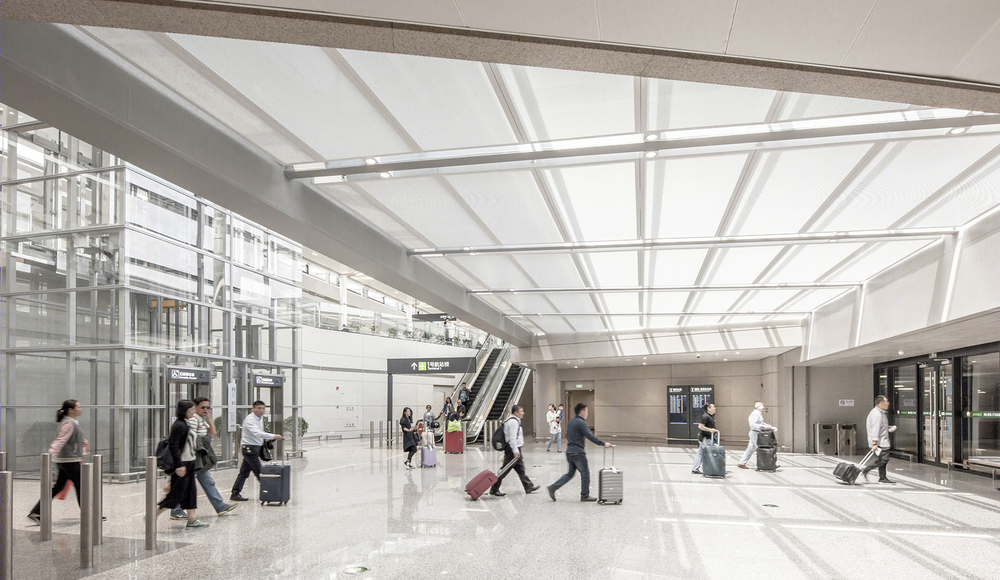
T1航站楼改造采用内敛、中性、方正的设计风格,与西侧的虹桥枢纽建筑风格遥相呼应。提取原航站楼中的设计元素,运用现代的手法全新演绎,将不同年代的空间有机融合,重塑成带有历史记忆的全新的航站楼形象。
Inherit the cultural context and reinterpret it with modern design techniques. The design, based on the in-depth interpretation of the original terminal, reflects Shanghai’s culture and creates an exquisite urban charm in space atmosphere, materials and colors.
▼车库绿化庭院,green courtyard of the parking area

▼航站楼外观新旧对比,exterior view before and after renovation

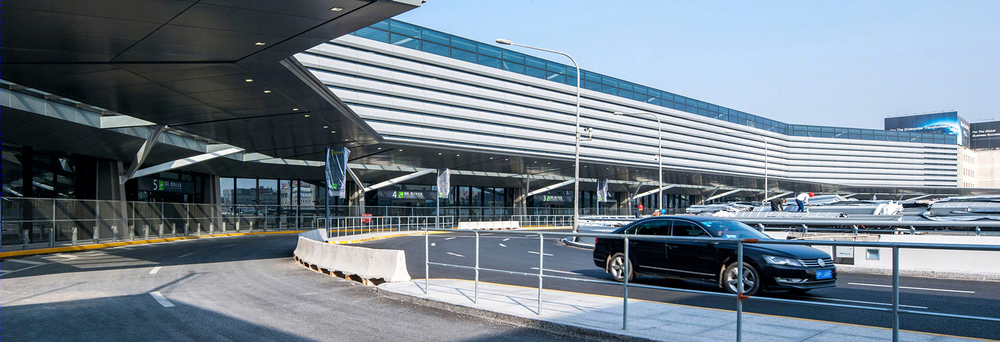
▼航站楼夜景,night view

▼车辆停靠区域改造前,drop-off area before renovation

▼车辆停靠区域改造后,drop-off area after renovation

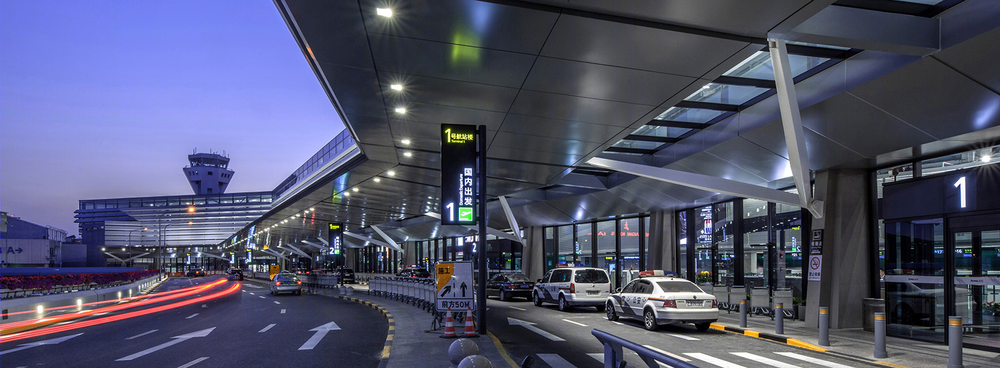
▼AB楼出发大厅改造前,departure hall of building A and B before renovation

▼AB楼出发大厅改造后,departure hall of building A and B after renovation

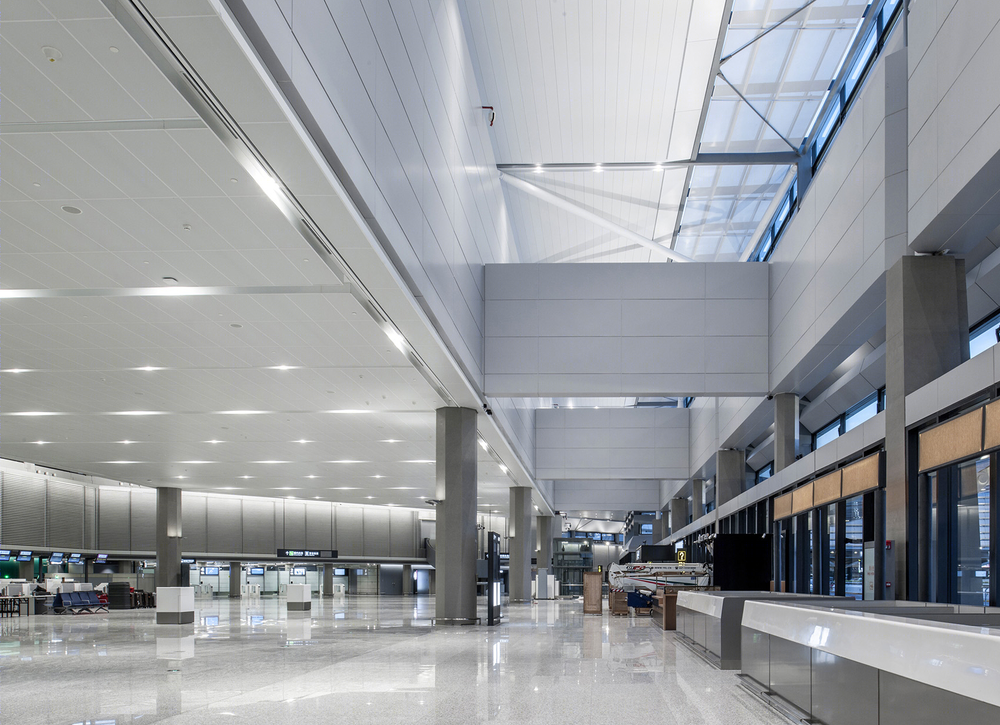
▼AB楼行李厅改造前,baggage claim area of building A and B before renovation

▼AB楼行李厅改造后,baggage claim area of building A and B after renovation
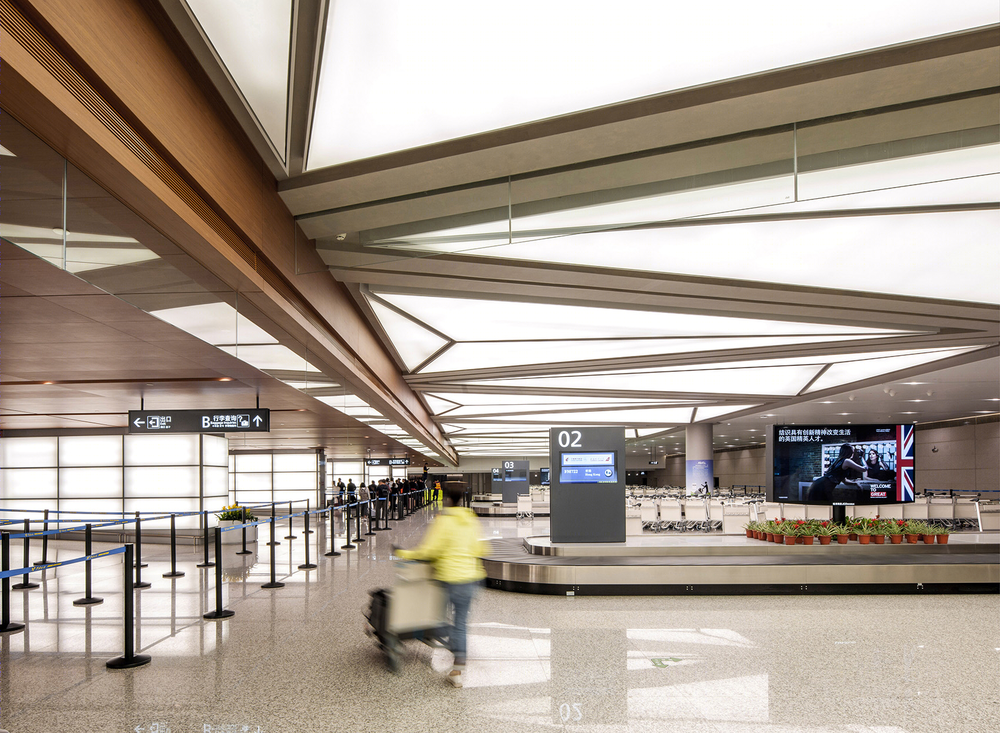
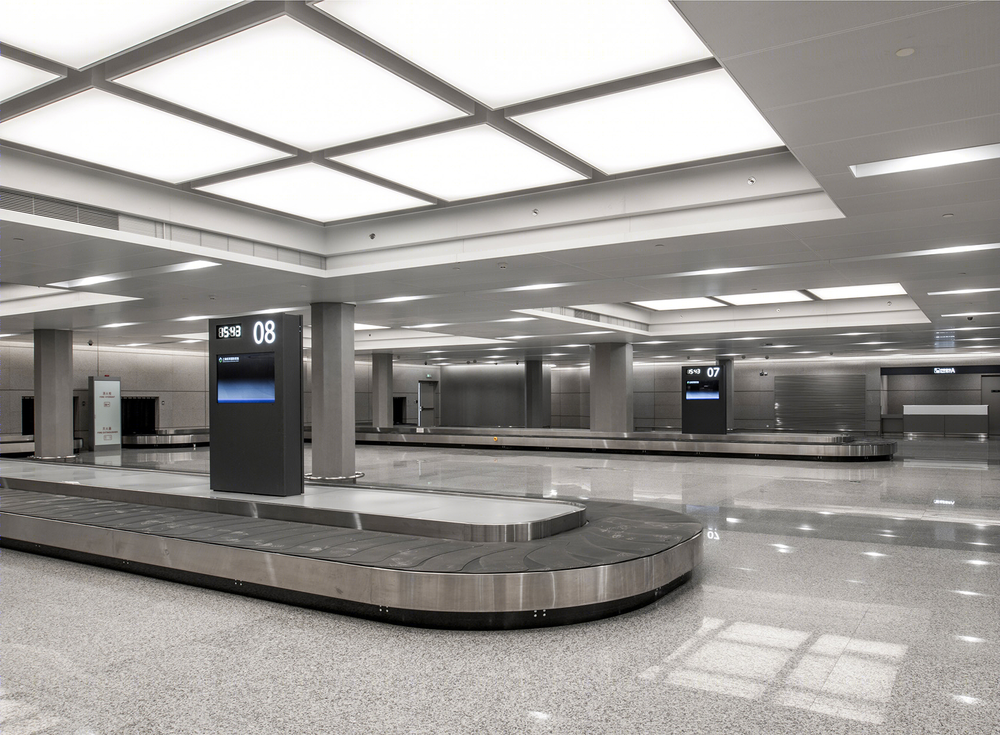
改造设计立足于既有机场建筑,结合建筑自身特点制定被动式的绿色策略,通过建筑围护结构优化,合理设计自然采光与自然通风,营造高效舒适空间。由于在绿色节能设计上的突出表现,项目获得 2017 GREEN SOLUTIONS AWARDS—Sustainable Renovation Grand Prize,2017绿色解决方案奖——既有建筑绿色改造解决方案大奖。
In order to provide most comfort experience with minimal resource and energy consumption, the design seeks the best fit under current conditions. The design fulfills the comfort and energy-saving needs of the terminal while taking into account and integrating the features of the existing building.
▼联检大厅,immigration inspection hall
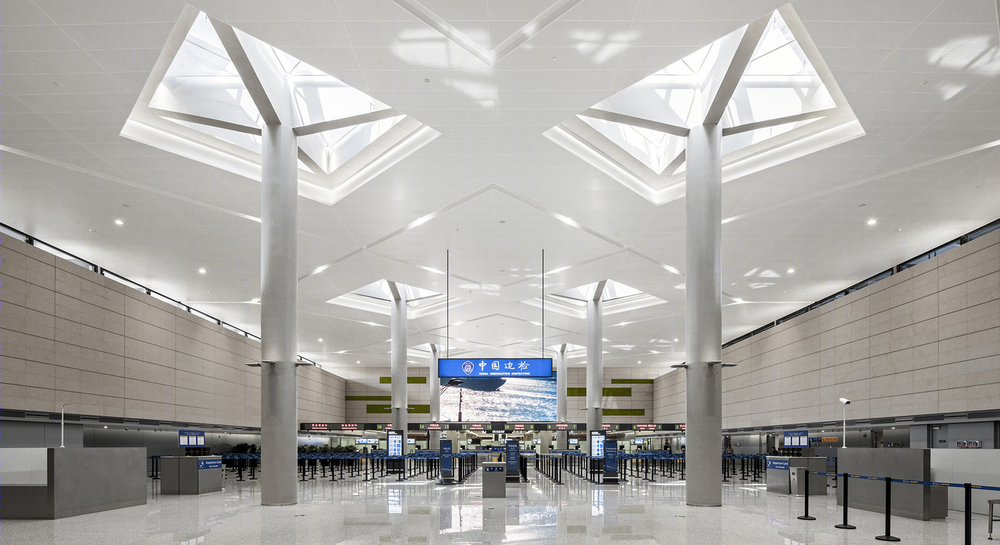

▼候机区,departure lounge
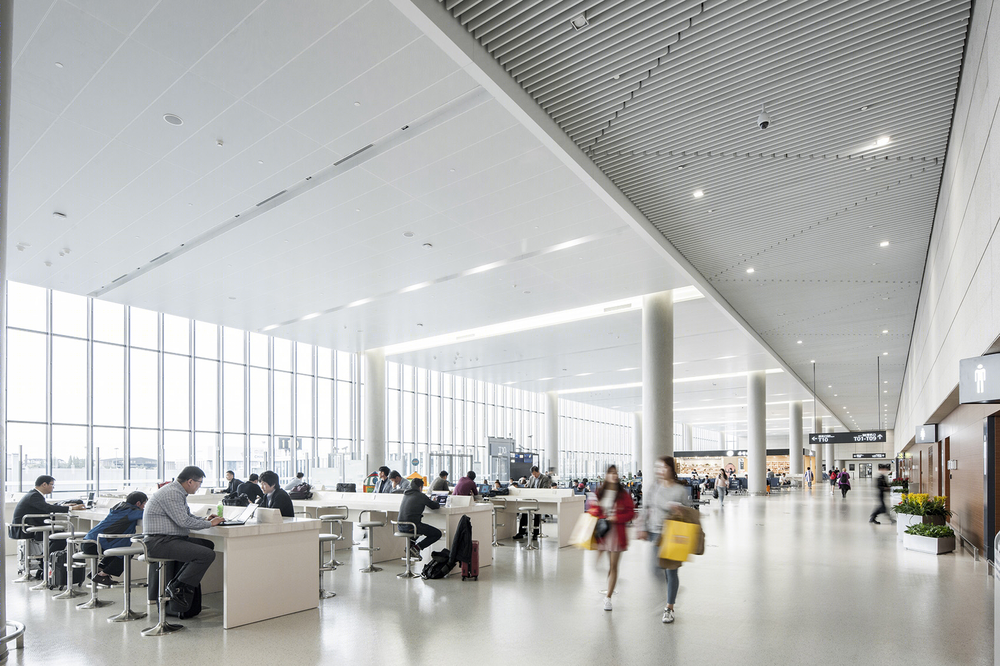

▼绿色设计采光分析,daylight analysis
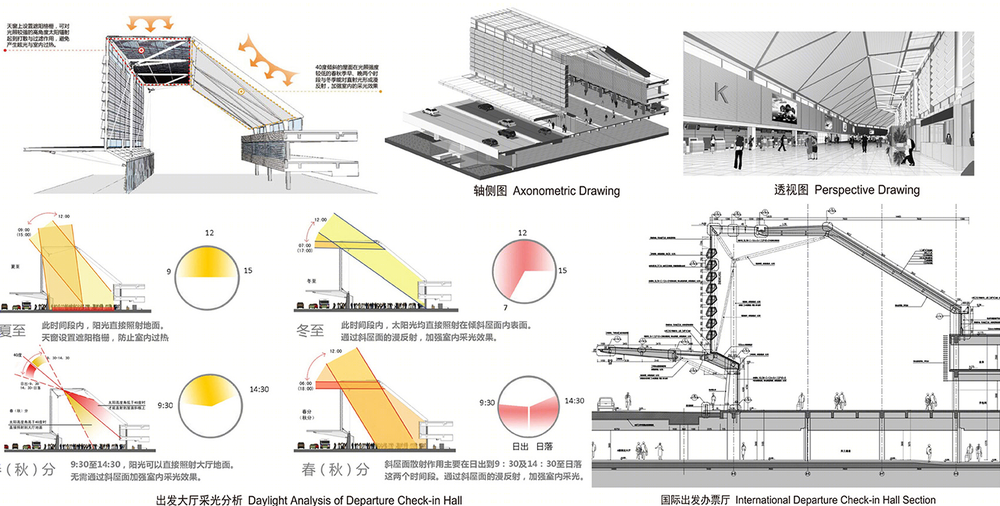
▼出发大厅自然通风分析,ventilation analysis
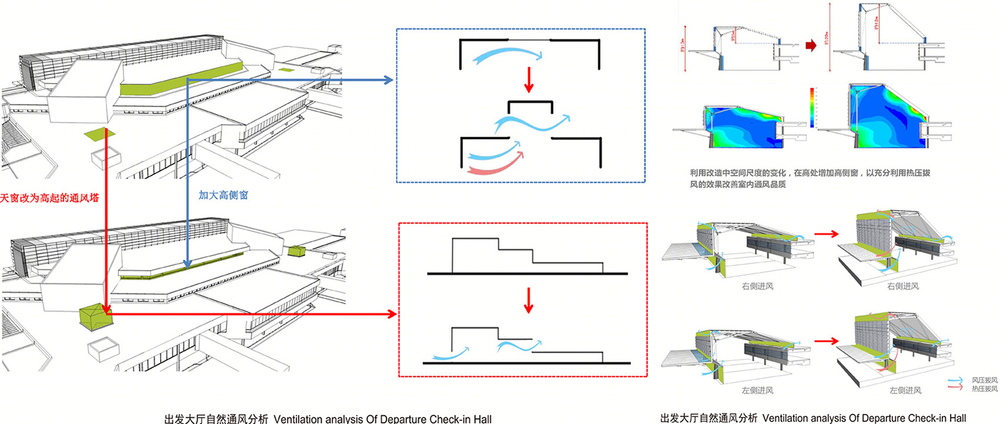
▼联检区设计分析,immigration inspection hall analysis
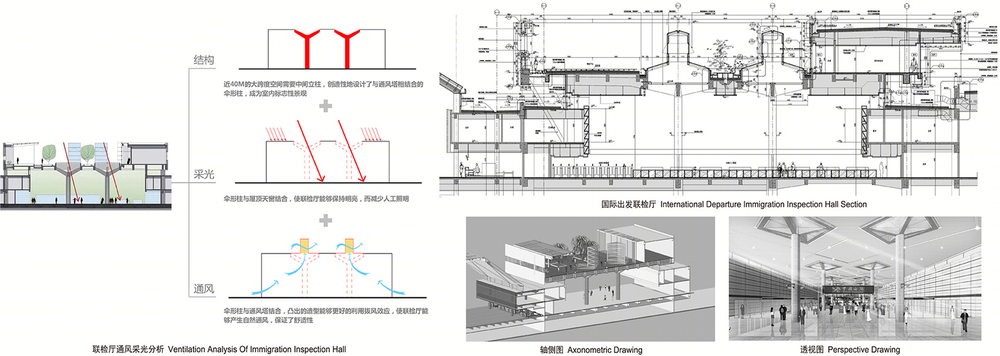
▼遮阳分析,sun shading analysis
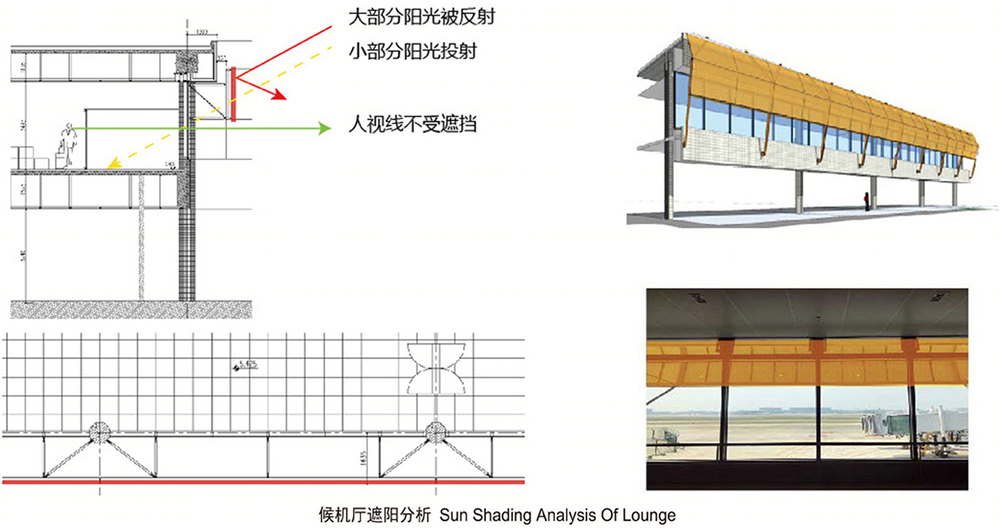
为保证改造过程中航站楼的正常运营,本次改造采取分阶段置换改造方式,充分考虑过渡期空间置换的便利性与可行性,保证分步改造施工中航站楼的正常运行。
The architects fully coordinate with airport operation department, airlines, and construc-tion firm to ensure the smooth running of the terminal during the renovation. There are both reconstructing area and operating area in the same terminal at the same time. Ter-minal 1-B is operating during terminal 1-A is under reconstruction, after the reconstruc-tion of Terminal 1-A is completed, the function of 1-A & 1-B would have an exchange to ensure the reconstruction of 1-B. The architects provides a complete and integrated reconstruction plan, that allows the terminal still providing complete passenger process in the two phases of the transformation.
▼分期建设,operation plan
